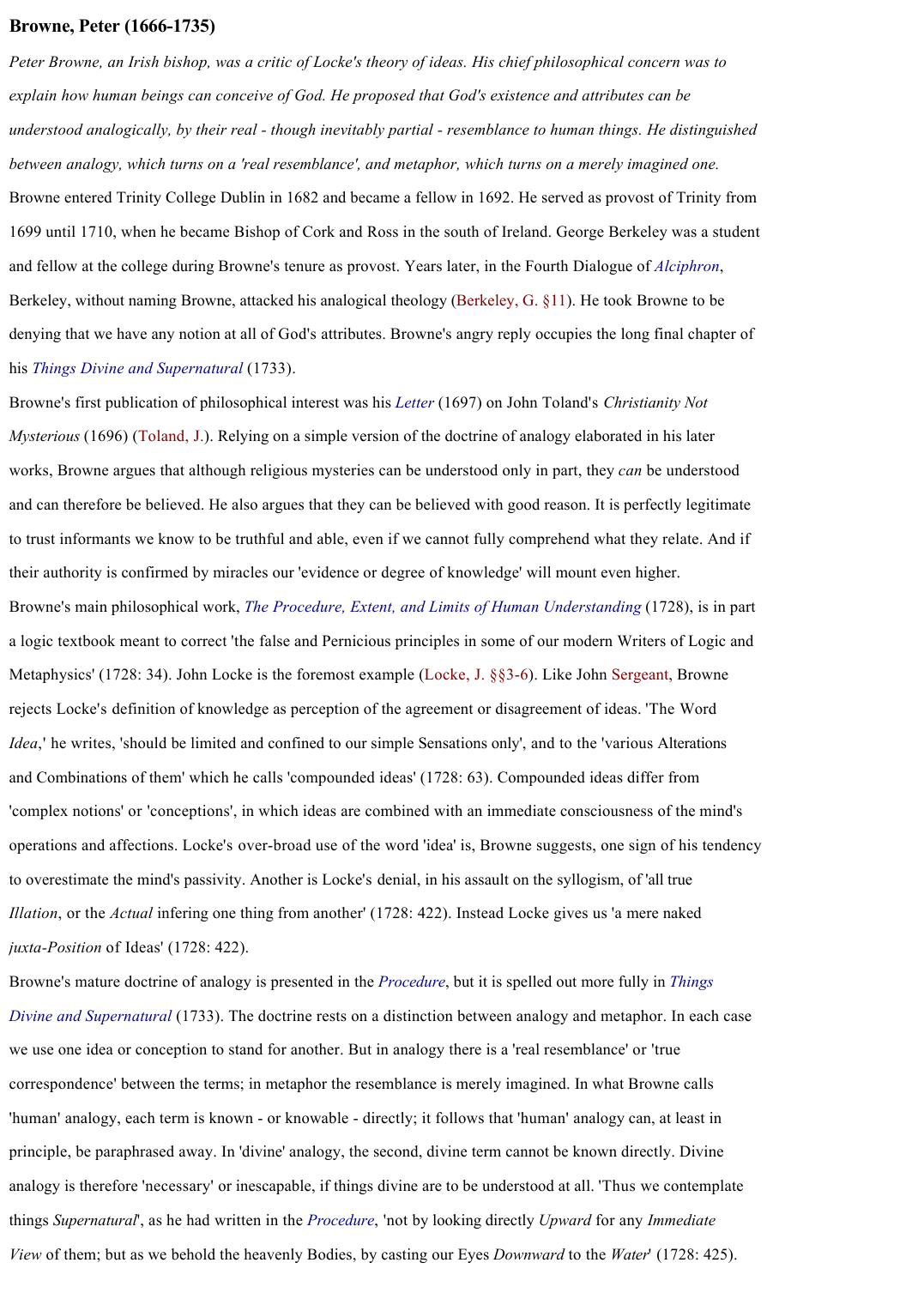Browne, Peter
Publié le 16/05/2020

Extrait du document
«
Browne, Peter (1666-1735)
Peter Browne, an Irish bishop, was a critic of Locke 's theory of ideas.
His chief philosophical concern was to
explain how human beings can conceive of God.
He proposed that God's existence and attributes can be
understood analogically, by their real - though inevitably partial - resemblance to human things.
He distinguished
between analogy, which turns on a 'real resemblance' , and metaphor, which turns on a merely imagined one.
Browne entered Trinity College Dublin in 1682 and became a fellow in 1692.
He served as provost of Trinity from
1699 until 1710, when he became Bishop of Cork and Ross in the south of Ireland.
George Berkeley was a student
and fellow at the college during Browne's tenure as provost.
Years later, in the Fourth Dialogue of Alciphron ,
Berkeley, without naming Browne, attacked his analogical theology ( Berkeley, G.
§11 ).
He took Browne to be
denying that we have any notion at all of God's attributes.
Browne's angry reply occupies the long final chapter of
his Things Divine and Supernatural (1733).
Browne's first publication of philosophical interest was his Letter (1697) on John Toland 's Christianity Not
Mysterious (1696) ( Toland, J. ).
Relying on a simple version of the doctrine of analogy elaborated in his later
works, Browne argues that although religious mysteries can be understood only in part, they can be understood
and can therefore be believed.
He also argues that they can be believed with good reason.
It is perfectly legitimate
to trust informants we know to be truthful and able, even if we cannot fully comprehend what they relate.
And if
their authority is confirmed by miracles our 'evidence or degree of knowledge' will mount even higher.
Browne's main philosophical work, The Procedure, Extent, and Limits of Human Understanding (1728), is in part
a logic textbook meant to correct 'the false and Pernicious principles in some of our modern Writers of Logic and
Metaphysics' (1728: 34).
John Locke is the foremost example ( Locke, J.
§§3-6 ).
Like John Sergeant , Browne
rejects Locke 's definition of knowledge as perception of the agreement or disagreement of ideas.
'The Word
Idea ,' he writes, 'should be limited and confined to our simple Sensations only' , and to the 'various Alterations
and Combinations of them' which he calls 'compounded ideas' (1728: 63).
Compounded ideas differ from
'complex notions' or 'conceptions' , in which ideas are combined with an immediate consciousness of the mind's
operations and affections.
Locke 's over-broad use of the word 'idea' is, Browne suggests, one sign of his tendency
to overestimate the mind's passivity.
Another is Locke 's denial, in his assault on the syllogism, of 'all true
Illation , or the Actual infering one thing from another' (1728: 422).
Instead Locke gives us 'a mere naked
juxta-Position of Ideas' (1728: 422).
Browne's mature doctrine of analogy is presented in the Procedure , but it is spelled out more fully in Things
Divine and Supernatural (1733).
The doctrine rests on a distinction between analogy and metaphor.
In each case
we use one idea or conception to stand for another.
But in analogy there is a 'real resemblance' or 'true
correspondence' between the terms; in metaphor the resemblance is merely imagined.
In what Browne calls
'human' analogy, each term is known - or knowable - directly; it follows that 'human' analogy can, at least in
principle, be paraphrased away.
In 'divine' analogy, the second, divine term cannot be known directly.
Divine
analogy is therefore 'necessary' or inescapable, if things divine are to be understood at all.
'Thus we contemplate
things Supernatural ', as he had written in the Procedure , 'not by looking directly Upward for any Immediate
View of them; but as we behold the heavenly Bodies, by casting our Eyes Downward to the Water ' (1728: 425)..
»
↓↓↓ APERÇU DU DOCUMENT ↓↓↓
Liens utiles
- Dans un entretien accordé au Magazine littéraire, le metteur en scène contemporain Peter Brook affirme : Le théâtre, quel que soit le thème abordé, ce sont des balles jetées par des jongleurs [ ... ]. Le théâtre, c'est du vivant raconté aux vivants. Vous discuterez cette définition du théâtre en vous appuyant sur le corpus et sur vos connaissances personnelles.
- PETER PAN
- PETER IBBETSON
- PETER FOLDES
- Peter Maravich.


